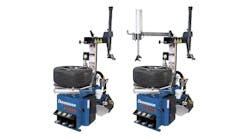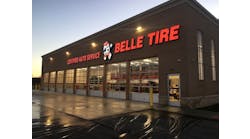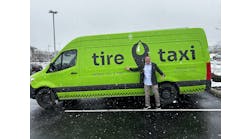Private brand Q&A: Cooper discusses changes in supplier-marketer relationships
The following interview is the first in a month-long series of exclusive one-on-one interviews with top executives from the industry's leading private brand tire marketers and manufacturers.
Cooper Tire & Rubber Co. is the largest private brand tire manufacturer in the United States. The Findlay, Ohio-based company builds tires for some of the private brand segment's most prominent marketers, including TBC Corp., Hercules Tire & Rubber Co. and Del-Nat Tire Corp.
While Cooper does not plan to reduce its private brand production, company officials are adjusting to evolving market demand and customer expectations. In this www.moderntiredealer.com, exclusive, Phil Caris, Cooper's vice president of sales and marketing, North America, discusses the changing nature of private brand supplier-marketer relationships.
MTD: What is Cooper's assessment of the current state of the private brand tire market?
Caris: We believe private brands will continue to be a meaningful component of the market. But there are a number of factors that are influencing and impacting the private brand sector. If you take a look at what’s going on from an economic perspective, there is more of a drive from the consumers’ perspective to value.
In other industries, you’re seeing a shift to private label products. We’re seeing a shift to more of a value-line purchase. One of the challenges that’s taking place is traditionally, private label tires have always (been) down in that value segment, and until we started seeing a lot of low-cost imports come into the market over the last number of years, they alone enjoyed the majority of that value segment. So there are challenges coming in from the low-cost imports.
Private brand marketers have responded by shifting some purchasing to offshore companies or trying to partner with their domestic manufacturers to source some of their product from their own low-cost facilities. We’re finding a good many of the private brand marketers are becoming pretty nimble.
MTD: How is the influx of low-cost, offshore tires impacting private brand pricing and margins?
Caris: It has forced private brand marketers to really make sure they have a good portfolio of suppliers so they can address different segments. Private brand marketers have opening price point tires, but they also have their mid-range and premium offerings as well.
If you look at the value equation private branders bring to the marketplace, they provide a degree of exclusivity to different distributors and customers. One of the nice things about having an exclusive product is the profitability it affords. It allows distributors to customize some of their programs. But at the end of the day, private branders have to hit that value segment for the consumer.
MTD: Did Goodyear Tire & Rubber Co.'s exit from certain segments of the private brand business several years ago open doors for Cooper?
Caris: It did, but the way I would put it is that it provided us with a number of opportunities to strengthen the relationships we had with marketers, as well as strengthen the portfolio of products that we were able to offer them.
MTD: As a private brand manufacturer, has Cooper encountered any emerging or evolutionary challenges in supplying such a vast quantity and range of private brand products to so many different customers?
Caris: I think the biggest challenge we're facing is that we need to continue to work with our private brand customers in terms of how we can be more efficient in handling the supply chain costs that are involved… the supply chain from the point of manufacture to the retailer.
Another thing we work very closely with our customers on is continuing to provide the portfolio of products they need, while at the same time remaining efficient from an operations perspective. We work very closely with them in the design of the product to how we get the product to them.
MTD: I would think the process has become more complicated due to all the SKUs that have flooded the market...
Caris: It has. It’s important to understand the consumer side of the private label business. You don’t see a real strong presence in ultra-high performance tires and some of the specialty ligh trtuck products.
MTD: Does Cooper have plans to reduce its private brand busines because of the current economic environment?
Caris: We don’t have any plans to exit the private brand business or a particular segment of it. We remain committed to being a major players.
Obviously, as the marketplace evolves, you always look at your portfolio of products and how you approach it. But we’re actively engaged with all of our major private brand customers in putting together future product plans and looking at where we’re going to be going over the next three or four years with each other.”
Stay tuned to www.moderntiredealer.com throughout the month of May for more exclusive private brand executive interviews!



